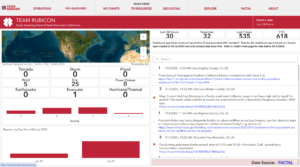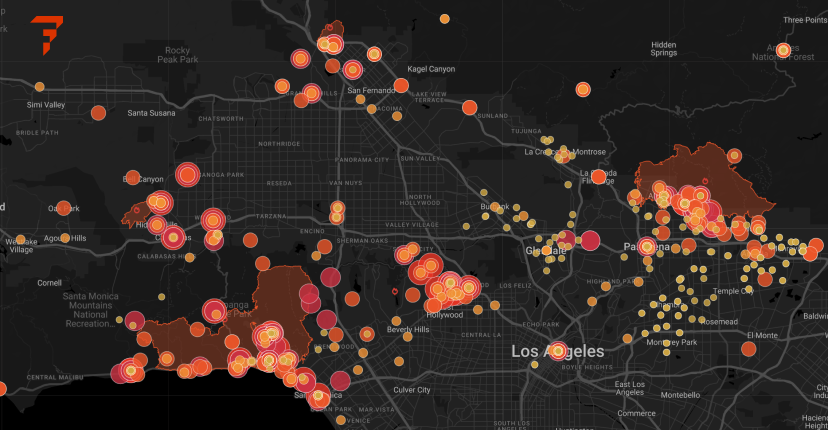The LA fires of 2025 are likely to be the most expensive disaster in U.S. history. AccuWeather’s estimated losses stretch to $150 billion. The insurance impacts will be felt from the shores of the Pacific to New England. Sadly, the death total will continue to grow as authorities and relief agencies inspect the damages as more than 12,000 structures are lost.
A large event across many jurisdictions with information splintered across dozens of platforms is chaotic and challenging. When the unexpected and unprecedented happens, it’s critical for the teams rushing to respond to have information they can trust in real time.
“Factal was one of the first places where we learned about the rapid outbreaks and movements of the fires,” said Andrew Schroeder, Vice President of Research and Analysis for Direct Relief. “Rumors and misinformation are knocked down quickly on Factal, which is a huge help as we try to orient to the rapidly changing flows of information from many different channels.”
Direct Relief is one of dozens of disaster relief NGOs using Factal for free as they aid the people of Southern California.
Factal editors helped member organizations trying to protect assets, evacuate employees and maintain operations with critical understanding. With a live incident chat, the companies and NGOs have had a dedicated space to share intelligence, collaborate with editors and and even knock down misinformation.
Factal North America lead editor Joe Veyera was on shift during Factal’s earliest alerts. “Finding information about the LA fires isn’t the hard part, but parsing what’s real and what’s not can be far more difficult. As a team of experienced journalists with experience covering large-scale disasters, we know which sources to trust and our members know they can trust our updates.”
Editors watching press conferences, live coverage from TV, trusted sources via multiple social platforms and the open-source internet provided corporate and NGO members relevant alerts, rather than raw data and noise. With multiple false evacuation notices going out and the confusion from CalFire’s precise but taxonomic naming system raw data may not be relevant. Members can follow Factal’s coverage here.
Adding in rumors and platform variance leads to life-threatening delays when responding during a disaster. The chaos on the ground is more than enough for responders.
What makes the LA fires particularly challenging is the intersection of urban complexity and environmental hazards. […] Navigating these challenges requires a coordinated effort, and Factal’s trusted updates have helped us stay one step ahead in this dynamic environment.
– Nathan Goggans, Beacon Rescue
Nathan Goggans from Beacon Rescue says, “What makes the LA fires particularly challenging is the intersection of urban complexity and environmental hazards. [Hundreds of] thousands of residents have been displaced, infrastructure damage has led to widespread boil water notices, and hazardous air quality adds another layer of risk. Navigating these challenges requires a coordinated effort, and Factal’s trusted updates have helped us stay one step ahead in this dynamic environment.”
These fires are not new to California or the United States, and in the changing climate are becoming more common. An era that many in resilience, continuity and security are calling a polycrisis will require companies, governments and relief organizations to work from verified facts, relevant to specific locations and shared quickly.
Sorting through the glut of information available is becoming an untenable method for security and continuity pros. Data overload (noise) is dangerous and costly. Journalists, seeking truth, insert trust back into intelligence helping organizations act faster.

“We have Factal as part of our Common Operation Picture,” Nick Mrzlak, Director of Mission Support for Team Rubicon, says, “and use it regularly for situation awareness, including the LA fires. This is part of our planning process and the automation that makes the COP a valuable tool for TR Planning.
“Factal is not our only source of information, but it is a convenient one-stop shop for anyone on the team who is looking for up-to-date information from trusted sources. Factal creates one layer in our information for targeting locations where we can bring TR services to bear.”
Team Rubicon uses Factal through an integration with ArcGIS. Factal’s core map included fire perimeters, satellite fire detection, wind and air quality in addition to the geolocated updates for fire starts and evacuations. (See the image at the top of the article for a sense of the coverage.)
Team Rubicon, Direct Relief and Beacon Rescue are three of the nearly 300 NGOs using Factal for free. Each is applying their expertise in LA in different ways.
Beacon Rescue, which normally does rescue operations in the US South, is helping with intelligence and on-ground liaising with several local organizations that don’t have intel bandwidth at this time.
“This includes assessing community needs, improving information flow, and ensuring relief resources are directed where they’re most needed. Factal has been critical in enabling us to deliver real-time situational awareness and disaster intelligence, which enhances both our operations and those of our partners.”
The people of LA, currently focused on trying to contain the fires around them as more may start during the red flag warnings this week, have the support of these NGOs, but also the businesses that operate in the region.

These fires are just one example of how the pace of dangerous events remains faster than the pace of trusted information. Factal members were prepared because the earliest warnings reached relevant people. Assets were pre-deployed and staffing shifted to address the immediate need to reduce the impact of the disasters.
As the fires continue to burn, Factal’s technology and editorial team will be there to help security and resilience teams make sense of the developments, not just the aftermath.
What is Factal?
Trusted by many of the world’s largest companies and more than 300 humanitarian NGOs, Factal is a risk intelligence and collaboration platform that brings clarity to an increasingly noisy and uncertain world.
Powered by a hybrid of advanced AI and experienced journalists, Factal detects early signals, verifies critical details and assesses the potential impact at the speed of social media. From physical incidents to geopolitical developments, Factal offers the most trusted, real-time risk intelligence on the market.
Factal is also home to the largest security and safety collaboration network in the private sector. Members securely share information with other members in proximity to the same incident, both on Factal.com and the Factal app.
Learn more at Factal.com.

